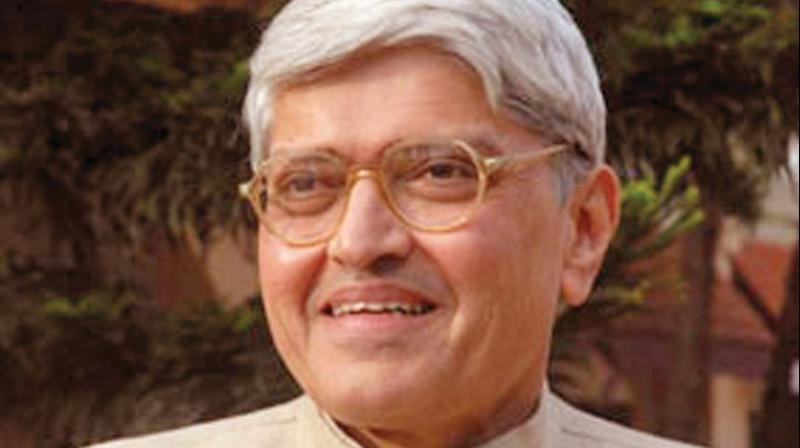Wellsprings of human love' as antidote to politics of hate
These anguished thoughts expressed by Gopalkrishna Gandhi are not to be dismissed as didactic or being prescriptive.

Chennai: The serious concerns about the politics of hate growing in the country flagged by the former West Bengal Governor, writer and thinker Gopalkrishna Gandhi, particularly in some of his public speeches in Tamil Nadu, in itself speaks for a geographical and cultural moderation that the land of the saint-poet Thiruvalluvar offers in its entirety.
Mr Gopalkrishna Gandhi, grandson of Mahatma Gandhi and Rajaji, both at the recent convocation of the Periyar Maniyammai University (PMU) near Thanjavur and earlier in August at the diamond jubilee celebrations of the Kalki Group of Tamil publications in Chennai, had significantly drawn attention to how despite serious ideological differences, leaders like Rajaji and Periyar and again Rajaji and Kamaraj, had not allowed that to cloud their personal relationships and how their lives were an exemplar of upholding “mutual respect” in public life.
“The differences between Kamaraj and Rajaji (both former CMs) now belong to history; even when they were adversaries in a political sense, they were not adversaries in a personal sense,” said Gopalkrishna Gandhi when he spoke at the Kalki function.
And just couple of days ago at the PMU, expressing anguish about how “respect for the opponents and their views” was dwindling in the national political scene and how use of regrettable words to describe political opponents was “vitiating the political atmosphere”, Mr Gandhi, to drive home his point, highlighted how Periyar and Rajaji, for all their ideological polarity, always had a “mutual respect” for each other, which stemmed from a “tremendous balance” and a political memory that was not just reduced to “bitterness”.
These anguished thoughts expressed by Gopalkrishna Gandhi are not to be dismissed as didactic or being prescriptive. They come as a timely springboard to reflect on the possibility of how the politics of hate could be moderated, even reversed to a large extent, if only the human psychology that makes up the ‘spirit of revenge’ is overcome by more positive outlook to life by trying to discover the wellsprings of human love.
Today’s youth are a much more well read and better informed, more so through the aid of latest technologies. But, strangely, the process of rediscovering the great icons, whose lives despite their personal suffering have been ‘wellsprings of human love’, is conspicuous by its absence in current narratives.
Whether it is liberal thought-leaders and courageous, yet well-meaning experimenters like Sri Ramakrishna Paramahamsa, Swami Vivekananda, Mahatma Gandhi, Rabindranath Tagore, Jawaharlal Nehru, Dr Sarvepalli Radhakrishnan or the whole group of scholars and intellectuals who earlier drove the Indian Renaissance from Bengal, or leaders like Sathyamurthi, Rajaji, Periyar and C.N. Annadurai down South in Tamil Nadu, anything to do with the liberal and the progressive spirit is now termed old-fashioned.
Not many may agree now that the great psychologist Erich Fromm’s The Art of Loving is still a great read, telling us how the ‘wellsprings of human love’ in inter-personal relations could be discovered if one gives up the ‘extremes of masochism and sadism’.
And the splendid spiritual imagination of a contemporary Indian philosopher, late Prof. Ramchandra Gandhi could see in Ramana Maharishi, the sage of Thiruvannamalai, as a complement to the spirit of Mahatma Gandhi, in being a beacon, sitting at just one place and ethereally guiding the nation’s destiny when Gandhiji was travelling every nook and corner of India during the freedom struggle.
Dr Sarvepalli Radhakrishnan was inclined to see this ‘soul-force’ in the language of ‘the Aatman and Brahman’, that has the true potential to obliterate all social/caste differences, and make us see as being equal partners in the inhospitable terrain of human destiny. Yet another remarkable and forgotten contemporary Indian philosopher Kalidas Bhattacharyya (1911-1984), has put the issues so admirably, as explained by Prof. J.N. Mohanty (Kalidas Bhattacharyya as Metaphysician): “Kalidas Bhattacharyya’s lectures and writings in the 1940s were marked by attempts to defend every philosophical position against all possible criticisms, to give it as plausible a formulation as possible…his basic commitment to orthodoxy is founded on a prior liberalism. The merely liberal who revels in ceaseless evaluation of abstract possibilities is, as he writes in an essay A Modern Defence of Orthodoxy, “a useless gymnast’”.
Thus, one learns from a great thinker like Kalidas Bhattacharyya that the possibility of being ‘liberal’ is realistically grounded in being open to all possibilities. No wonder Mahatma Gandhi saw his whole life as ‘Experiments with Truth’, even as ‘Ultimate Truth’ is unattainable given man’s finite and fallible nature. It is to such icons and thought-leaders we need to look back to help revive the ‘wellsprings of human love’ that could keep the politics of hatred at bay.

